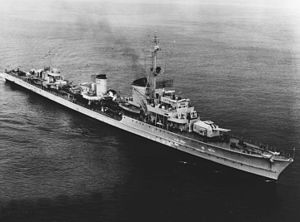Type 1936A destroyer
 Z39 in September 1945
| |
| Class overview | |
|---|---|
| Operators | |
| Completed | 15 |
| Preserved | 0 |
| General characteristics | |
| Class and type | Narvik-class destroyer |
| Displacement |
|
| Length | 127 m (416 ft 8 in) |
| Beam | 12 m (39 ft 4 in) |
| Draught | 4.65 m (15 ft 3 in) |
| Installed power | 70,000 hp (52,200 kW) |
| Propulsion | 2 shafts, geared turbines 6 boilers |
| Speed | 37½ knots (69 km/h) |
| Range | 3650 nmi at 18 knots |
| Endurance |
|
| Complement | 220 officers and men |
| Armament |
|
The Zerstörer 1936A-class destroyers, or Narvik-class destroyers as they were known to the Allies, were a class of German destroyers of the Second World War. In common with other German destroyers launched after the start of World War II, the Narviks were unnamed, known only by their hull numbers - Z23 to Z39.
Design
In terms of armament, they were closer to light cruisers than the typical destroyer. The use of 15 cm (5.9 inch) guns was atypical of destroyers which tended to have guns around 120 – 127 mm (4.7 to 5 inch) in calibre. They were intended to carry two forward guns in a twin turret, but as the twin turrets were not ready in time, early class 1936As carried a single mounted gun forward.
Despite being powerful the ships were not without their flaws. There were problems with the reliability of the high pressure steam engines and seakeeping in rough seas due to the newly designed bow and heavy forward artillery.
The eight ships of the Zerstörer 1936A class (Z23 to Z30) were all laid down between 1938 and 1940. The seven destroyers numbered from Z31 to Z39 were classed as Zerstörer 1936A (Mob); they were laid down in 1940 and 1941 and were slightly larger and had some internal modifications (including engines that caused less trouble than with their predecessors) from the original design to shorten construction times.
Ships
The class, including the 36A (Mob), consisted of 15 ships. All were built in Bremen by AG Weser shipyard (part of Deutsche Schiff- und Maschinenbau AG/Deschimag) apart from Z37, Z38 and Z39 which were built by Germania (Kiel).
1936A
| Ship | Laid down | Commissioned | Fate |
|---|---|---|---|
| Z23 | 15 November 1938 | 15 September 1940 | Badly damaged by bomb hit on 12 August 1944 and decommissioned on 21 August. Taken by France after the war and renamed Leopard. Scrapped in 1951. |
| Z24 | 2 January 1939 | 26 October 1940 | Sunk on 25 August 1944 near Le Verdon by British bombers. |
| Z25 | 15 February 1939 | 30 November 1940 | Taken by France after the war and renamed Hoche. Scrapped in 1958. |
| Z26 | 1 April 1939 | 11 January 1941 | Sunk in battle by the British cruiser Trinidad and destroyer Eclipse on 29 March 1942 in the Barents Sea while attacking Convoy PQ-13. |
| Z27 | 27 December 1939 | 26 February 1941 | Sunk in battle with British light cruisers Glasgow and Enterprise on 28 December 1943 in the Bay of Biscay. |
| Z28 | 30 October 1939 | 9 August 1941 | Sunk by British bombers on 3 March 1945 near Saßnitz in the Baltic Sea. |
| Z29 | 21 March 1940 | 25 June 1941 | Taken by Britain after the war and given to the USA. Scuttled because of her poor condition by US Navy on 16 December 1946 near Jutland. |
| Z30 | 15 April 1940 | 15 November 1941 | Taken by Norway after the war and given to Britain. Used as target ship and scrapped in 1949. |
1936A (Mob)
| Ship | Laid down | Commissioned | Fate |
|---|---|---|---|
| Z31 | 1 September 1940 | 11 April 1942 | Taken by France after the war and renamed Marceau. Scrapped in 1958. |
| Z32 | 1 November 1940 | 15 September 1942 | Damaged in battle with Canadian destroyers Haida and Huron on 9 June 1944 during the Battle of Ushant and beached. Later destroyed by air attacks. |
| Z33 | 22 December 1940 | 6 February 1943 | Taken by Soviet Union after the war and renamed Provorniy (Проворный). Sunk as target ship in 1961. |
| Z34 | 15 January 1941 | 5 June 1943 | Taken by USA after the war. Scuttled because of her poor condition by US Navy on 26 March 1946 near Jutland. |
| Z37 | 1940 | 16 July 1942 | Collided with destroyer Z32 on 1 January 1944 and badly damaged. Decommissioned on 24 August and scuttled the same day in Bordeaux. Scrapped in 1949 |
| Z38 | 1940 | 20 March 1943 | Taken by Britain after the war and renamed Nonsuch. Used for testing effects of underwater explosions, contrary to expectations it broke in half during the first test[1] and was scrapped between 1949 and 1950. |
| Z39 | 1940 | 21 August 1943 | Taken by Britain after the war and given to USA. Renamed DD-939 and used for testing. Given to France in 1947 and used as spare part supply for other German vessels in service. Scrapped in 1964. |
See also
References
This article includes a list of general references, but it lacks sufficient corresponding inline citations. (November 2013) |
- ^ Brown Nelson to Vanguard (2000) Chatham Publishing p172
- M J Whitley, Destroyers of World War 2, 1988 Cassell Illustrated, ISBN 1-85409-521-8
